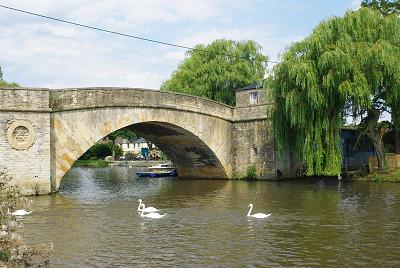Lechlade
 Halfpenny Bridge with Tollhouse
Halfpenny Bridge with Tollhouse
It is a short distance to Halfpenny Bridge which could be considered the first “proper” bridge of the river in that it has sufficient headroom to allow river-craft to pass freely underneath. There are 106 more bridges that cross the navigable river between Lechlade and the Flood Barrier. Halfpenny Bridge was constructed in 1792 by James Hollingsworth, and the clearance of 4.72M (15ft 6in) was high enough at that time to avoid the need to lower the masts of the vessels passing beneath.
It does not stretch the imagination much to discover that the bridge originally took its name from the toll originally levied for crossing it. It was not a popular toll (are they ever?) and the locals were having none of it. Resentment increased every year and in 1839 they rebelled and all banded together and refused to pay the toll. This inevitably led to some lively altercations with the toll collectors, and people tended to cross the bridge in groups in a show of strength to make it easier for them to resist the demands of the toll gatherers. All efforts at extracting tolls were finally abandoned in 1875 and the bridge has been toll-free ever since. Perhaps some of the descendants of those early liberators would like to accompany me down to London and campaign to get rid of Cuddly Ken’s much hated London congestion charge. (NB In a few days time and before I reach the capital, Cuddly Ken was displaced by Bouncing Boris, but the detested congestion “toll” still remained in place).
Lechlade is mentioned in the Doomsday Book, and has been a major borough since the early 12th century. The town signs announce that Lechlade is an inland port, and this was the foundation of its wealth. Although the town was a major force for the English wool trade, Lechlade’s primary function was as a staging post for freight to London. Cotswold wool and the finest Gloucestershire cheeses were the main goods that were brought to the wharves of Lechlade for transfer to the river barges that would take them to the commercial market places of London. The opening of the Severn and Thames Canal increased the volume of trade immensely and the town grew very wealthy as a consequence.
The landmark church dates from 1476 and is considered to be one of the finest in Gloucestershire. It is believed that it was dedicated to St Lawrence at the wish of Catherine of Aragon whose pomegranate symbol can be seen on the vestry door.
The poet Percy Bysshe Shelley visited Lechlade in September 1815. Standing in the churchyard with Mary his wife, and friends Charles Claremont and Thomas Love Peacock he watched the sun setting and was inspired to write his poem “Summer Evening Churchyard, Lechlade”.
THE wind has swept from the wide atmosphere
Each vapour that obscured the sunset's ray,
And pallid Evening twines its beaming hair
In duskier braids around the languid eyes of Day:
Silence and Twilight, unbeloved of men,
Creep hand in hand from yon obscurest glen.
They breathe their spells towards the departing day,
Encompassing the earth, air, stars, and sea;
Light, sound, and motion, own the potent sway,
Responding to the charm with its own mystery.
The winds are still, or the dry church-tower grass
Knows not their gentle motions as they pass.
Thou too, aerial pile, whose pinnacles
Point from one shrine like pyramids of fire,
Obey'st in silence their sweet solemn spells,
Clothing in hues of heaven thy dim and distant spire,
Around whose lessening and invisible height
Gather among the stars the clouds of night.
The dead are sleeping in their sepulchres:
And, mouldering as they sleep, a thrilling sound,
Half sense half thought, among the darkness stirs,
Breathed from their wormy beds all living things around,
And, mingling with the still night and mute sky,
Its awful hush is felt inaudibly.
Thus solemnized and softened, death is mild
And terrorless as this serenest night.
Here could I hope, like some enquiring child
Sporting on graves, that death did hide from human sight
Sweet secrets, or beside its breathless sleep
That loveliest dreams perpetual watch did keep.
< Previous Page | Next Page >